by Lisa Cooke | Apr 10, 2013 | 01 What's New, Ancestry, Records & databases, Research Skills, United States
It’s time to pay taxes in the United States! 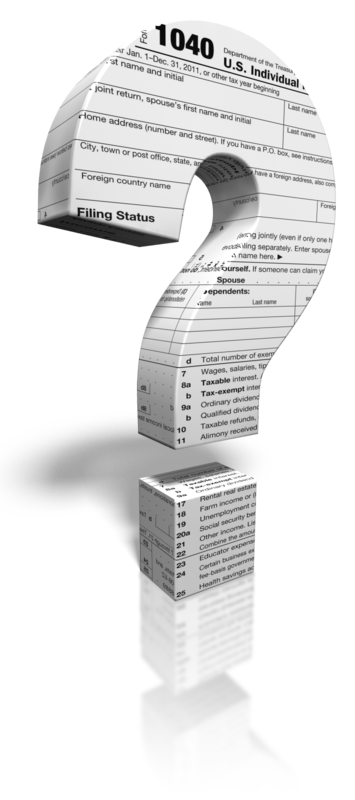 Is it any consolation that our ancestors paid them, too? Here’s a brief history of U.S. federal taxation and tips on where to find tax records for the U.S. and the U.K.
Is it any consolation that our ancestors paid them, too? Here’s a brief history of U.S. federal taxation and tips on where to find tax records for the U.S. and the U.K.
According to the National Archives (U.S.), the Civil War prompted the first national income tax, a flat 3% on incomes over $800. (See an image of the 16th Amendment and the first 1040 form here.) The Supreme Court halted a later attempt by Congress to levy another income tax, saying it was unconstitutional. In 1913 the 16th Amendment granted that power. Even then, only 1% of the population paid income taxes because most folks met the exemptions and deductions. Tax rates varied from 1% to 6%–wouldn’t we love to see those rates now!
Ancestry.com has indexed images of U.S. federal tax assessment lists from the Civil War period (and beyond, for some territories). Here’s a sample image from Arkansas:
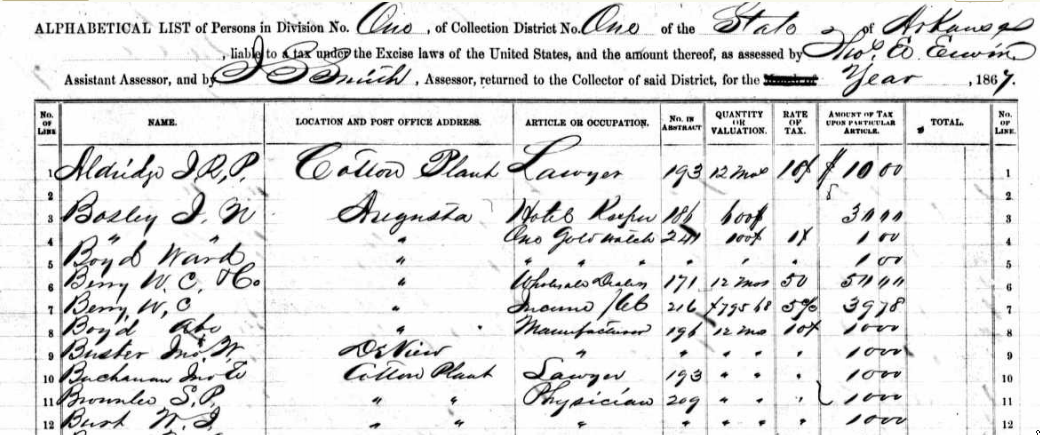
Of course, the U.S. federal income tax is just one type. Taxes have been levied on real estate, personal property and income by local, regional and national governments throughout the world.
Some tax records are online. Ancestry.com hosts tax records from London (1692-1932); the U.S. states of Pennsylvania, Tennessee, New York, Ohio, Georgia and Texas; and many from Scotland, Ireland, Canada and Russia (there’s more: see a full list and descriptions here). FamilySearch.org hosts over a million records each of U.S. state tax records from Ohio and Texas. FindMyPast hosts a wealth of U.K. tax records, from local rate books to Cheshire land taxes and even the Northamptonshire Hearth Tax of 1674.
In the U.S., look for original real estate and personal property taxpayer lists in county courthouses or state archives. Consult genealogical or historical organizations and guides. Or Google them! A Google search for “tax records genealogy Virginia” brings up great results from the Library of Virginia and Binns Genealogy. (Use the keyword “genealogy” so historical records will pop up. Without that term, you’re going to get results that talk about paying taxes today.)
I’ll leave you with this tantalizing list of data gathered in the Calhoun County, Georgia tax list of 1873: first, it enumerates whites, children, the blind/deaf/dumb, dentists, auctioneers, and those who have ten-pin alleys, pool tables and skating rinks. Then, real estate is assessed in detail. Finally, each person’s amount of money, investments, merchandise, household furniture, and investment in manufacturing is assessed.
As you can see, it can pay you big to invest time in looking for your ancestor’s tax records! Just make sure that if you’re here in the U.S., you’ve got your own taxes out of the way before you go searching for someone else’s.
 Like this post? Look around on the Genealogy Gems website! We have lots more free content to offer, including our flagship Genealogy Gems podcast, an online radio show that brings you the best “gems” in genealogy how-tos, inspiration and fun. We have more than 1.5 million downloads worldwide: listen and you’ll see why!
Like this post? Look around on the Genealogy Gems website! We have lots more free content to offer, including our flagship Genealogy Gems podcast, an online radio show that brings you the best “gems” in genealogy how-tos, inspiration and fun. We have more than 1.5 million downloads worldwide: listen and you’ll see why!
by Lisa Cooke | May 13, 2013 | 01 What's New, Canadian, History, Maps

How you speak can reveal much about your heritage.
If you’ve ever lived in or visited the U.S. or Canada, you already know we don’t all speak English the same way. But did you know that we actually speak eight different major dialects in North America?
The website North American English Dialects has put those dialects on the map. In fact, it even traces their origins and spread: 2 dialects from the west and 6 from the east, reflecting the way the English language originally spread across the continent.
Creator Rick Aschmann notes how we say our “r’s”, the 19 vowel sounds we use, and all those other great tiny variations that go into our Southern drawl or “broad-A” Boston-speak. Aschmann is just doing this project for fun, but he takes his map pretty seriously. He even asks anyone with a “native accent” to upload a sound file of themselves speaking.
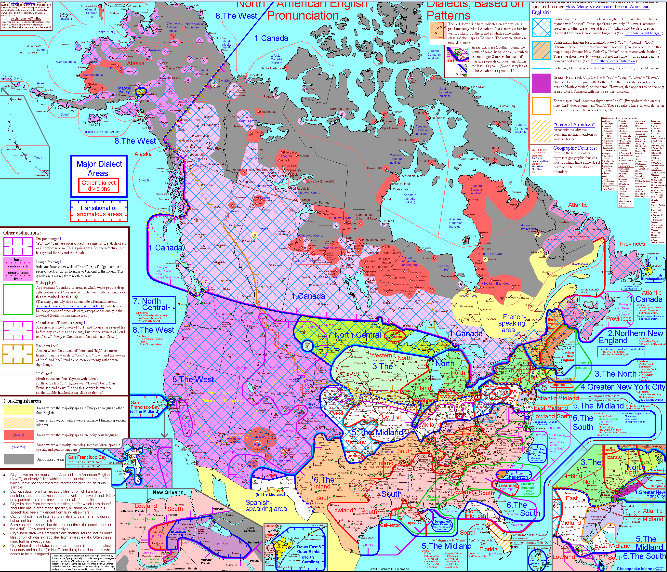 It’s fun to look at this map and think about how our American or Canadian buy pain medication uk ancestors may have pronounced things differently than we do (or the same, depending on how far we’ve wandered). If your families have migrated within the past 50 to 100 years, click on some of the sound samples from your old stomping grounds and see if you catch some familiar cadences or phrases.
It’s fun to look at this map and think about how our American or Canadian buy pain medication uk ancestors may have pronounced things differently than we do (or the same, depending on how far we’ve wandered). If your families have migrated within the past 50 to 100 years, click on some of the sound samples from your old stomping grounds and see if you catch some familiar cadences or phrases.
A Huffington Post writer says he could look at this map for hours and not get bored, and I agree! It’s complicated–there are lots of color codes and lines and such–but our speech is complicated, too. Some cities or small regions need their own enlarged maps to show neighborhood-level differences.
You can learn more about how our speech reveals our heritage and family history by listening to my interview with Dr. Robert Leonard Ph.D., Forensic Linguist in Genealogy Gems Podcast Episode 89. Dr. Leonard has been featured on the TV series Forensic Files and has a fascinating personal history as well.
by Lacey Cooke | Jan 5, 2018 | 01 What's New, British, Irish, Records & databases, Scottish Genealogy
Kick off 2018 with a diverse group of new genealogy records to explore online this week! Included are historical and vital records for British genealogy, Irish newspapers, Scottish records, and Palestine naturalization applications.
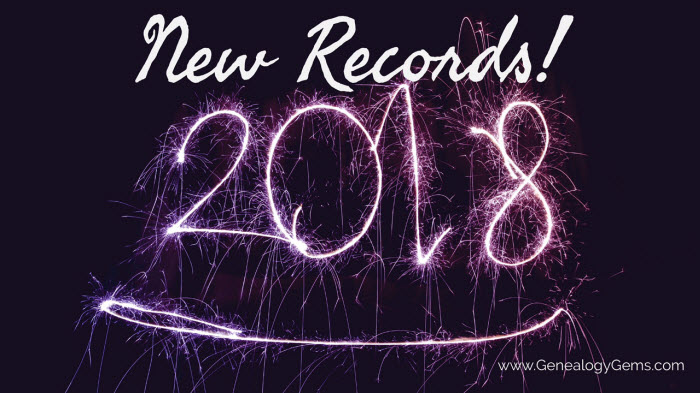
British Historical & Vital Records
Lots of new genealogy records are available for England this week at Findmypast! Start with Britain, Histories & Reference Guides, which contains more than 65 volumes about genealogy, heraldry, paleography, geography, and more. These volumes will expand your knowledge about your ancestor’s life and how your ancestors lived through the centuries.
Next, if you’ve got ancestors in Greater Manchester, you’ll want to explore Greater Manchester Burials 1570-1990 and Greater Manchester Marriages 1570-1936. Both collections pertain to the historic county of Lancashire and contain names, dates, and transcripts of the original registers. These collections both come from FamilySearch.
Finally, Northamptonshire Memorial Inscriptions may reveal your ancestor’s death date, burial place, as well as the names of other family members for your family tree. This collection includes 17 cemeteries, churchyards, and other places, and the records span from 1422 to 2015.
Irish Newspapers
The Church of Ireland’s record repository, Representative Church Body Library (RCBL), has announced that all 19th-century editions of the Church of Ireland Gazette have been added to the online archive of the weekly newspaper. The full archive is free to the public and covers years 1856 – 1923.
The British Newspaper Archive has added the Dublin Evening Telegraph to their collection of historic newspapers recently. This paper spanned 1871-1924, and this collection has over 12,000 issues available online.
Scottish Records
Recently added to Ancestry.com are Carnegie Music Institution Registers, 1910-1920 from Dunfermline, Fife. This school was founded through a trust set up by Andrew Carnegie, and school records include names, year and term of attendance, resident, and subject studied.
Additional news for Scottish research comes from the University of Virginia School of Law.
30 years after they acquired a trove of legal documents from Scotland’s Court of Session, the supreme legal court there, the Law School’s Arthur J. Morris Law Library is building a digital archive and reaching out to partners “across the pond” to open these legal history materials to scholars and the public. According to the press release, the library is planning to release the first batch of documents online soon. When completed, users will be able to search through a single document or the entire collection, peruse the rich data provided for each case, and download documents for free.
Palestine Naturalization Applications
A fascinating new collection at MyHeritage is the Mandatory Palestine Naturalization Applications, 1937-1947. From the collection description: “This collection is a unique and rich compilation of records documenting the efforts of individuals, mostly Jews, and sometimes their entire families, to establish citizenship in Mandatory Palestine, which was under British administration at the time. The collection contains photos, histories, passports, and other various forms providing details for each applicant.”
Let 2018 be your year to break down brick walls!
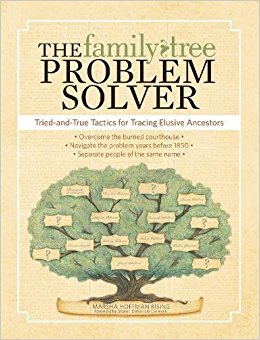 Has your family history research hit a brick wall? Marsha Hoffman Rising’s best-selling and recently updated book The Family Tree Problem Solver has the solutions to help you find the answers you seek. Get tips on finding vital records before civil registration, finding “missing” ancestors on censuses, advanced court records, workarounds for lost or destroyed records, common names, case studies, and more! This revised edition also includes new information about online research techniques and a look at the role of DNA research. Click here to order now!
Has your family history research hit a brick wall? Marsha Hoffman Rising’s best-selling and recently updated book The Family Tree Problem Solver has the solutions to help you find the answers you seek. Get tips on finding vital records before civil registration, finding “missing” ancestors on censuses, advanced court records, workarounds for lost or destroyed records, common names, case studies, and more! This revised edition also includes new information about online research techniques and a look at the role of DNA research. Click here to order now!
Disclosure: This article contains affiliate links and Genealogy Gems will be compensated if you make a purchase after clicking on these links (at no additional cost to you). Thank you for supporting Genealogy Gems!
by Lisa Cooke | Oct 16, 2015 | 01 What's New, Ancestry, British, Canadian, Church, Findmypast, MyHeritage, Records & databases, United States
Every week we blog about new genealogy records online. Which ones might help you find your family history? With whom should you share this good news? New this week: electoral registers for England, Wales and Ireland; British Columbia marriages and deaths; WWI-era absent voter lists for England; Dutch Christian Reformed Church records (US); Iowa prison records and over 46 million Swedish household records!
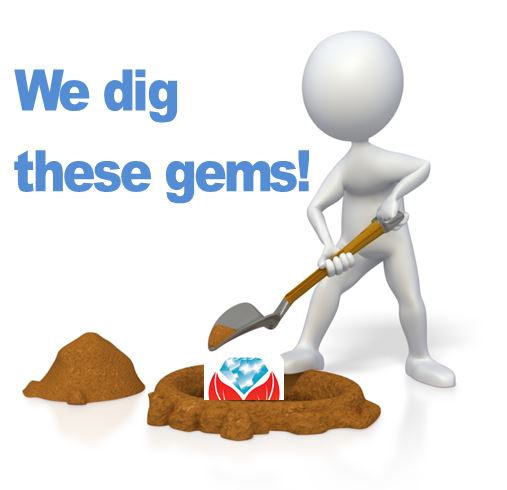
ENGLAND, WALES AND IRELAND ELECTORAL REGISTERS. A century’s worth of electoral registers for England and Wales (1832-1932) are now searchable for Findmypast subscribers, as are Irish registers for 1885-1886. According to a press release, the England and Wales database is the “largest single collection released on Findmypast to date with over 5.4 million images and approximately 220 million names.” These annual registers fill the gaps between censuses and can help you “discover where your family lived, when they could vote and details of the property your family owned in the 19th & 20th centuries.”
BRITAIN ABSENT VOTERS. The new Britain, Absent Voters Lists 1918-1921 at Findmypast “contains over 20,000 pages listing over 100,000 names of service men, women serving with the auxiliary forces, merchant seamen, diplomats and others…absent from their homes.” Because of the timing of the lists, they include “men who were killed, missing or taken prisoner in the period of time between the compiling of lists and the publication of the register. Records can reveal your ancestors name, a description of their service and their qualifying premises, allowing you to uncover details of the home they left behind and the part they played in one of history’s bloodiest conflicts.”
BRITISH COLUMBIA VITAL RECORDS. FamilySearch has updated its free collections of marriage and death records for British Columbia. Over 300,000 additional deaths are reported for 1872-1932 and 1937. Over 18,000 marriages have been added for the years 1859-1932 and 1937.
DUTCH CHRISTIAN REFORMED CHURCH RECORDS. Vital and membership records ((1856-1970) of the Dutch Christian Reformed Church are now searchable on Ancestry. This church split from the historic Dutch Reformed Church in 1858 in Michigan. Vital records include baptisms, marriages and deaths, and often include dates, places and the names and relationships of family members. Membership records include registers of entire families; information about transfers (moves) to different congregations, addresses, birth and baptismal dates.
IOWA CONVICTS. Convict registers from three Iowa state penitentiaries (1867-1970) are now on Ancestry: the Iowa State Penitentiary at Fort Madison, established in 1839; the Anamosa State Penitentiary in Anamosa; and the Iowa State Reformatory for Women in Rockwell City.
SWEDISH HOUSEHOLD RECORDS. Over 46 million household records dating 1880-1920 are now searchable at MyHeritage. According to the collection description, “The Household Examination Books are the primary source for researching the lives of individuals and families throughout the Parishes of Sweden, from the late 1600’s until modern times. The books were created and kept by the Swedish Lutheran Church which was tasked with keeping the official records of the Swedish population until 1991.”
 Thank you for sharing this list of great new resources with your genealogy buddies and for posting them on your society pages. Let’s spread the news!
Thank you for sharing this list of great new resources with your genealogy buddies and for posting them on your society pages. Let’s spread the news!
by Lisa Cooke | May 13, 2015 | 01 What's New, Canadian, Heirloom, images, Inspiration, Listeners & Readers, Memory Lane, Military, Photographs, Video, Writing Family History
 A recent email from listener Helen reminds us to search our basements and attics for unique and amazing family history finds. There’s no substitute for being able to tell family members’ stories through their own words and photographs.
A recent email from listener Helen reminds us to search our basements and attics for unique and amazing family history finds. There’s no substitute for being able to tell family members’ stories through their own words and photographs.
 “I just had to tell you about my recent find. My late father-in-law served in the Canadian Navy for 39 years, entering Naval College when he was only 14. Most of my knowledge about his life came from talking with him before he died. Of course, then I did not know the questions to ask.
“I just had to tell you about my recent find. My late father-in-law served in the Canadian Navy for 39 years, entering Naval College when he was only 14. Most of my knowledge about his life came from talking with him before he died. Of course, then I did not know the questions to ask.
“About a month ago, I was preparing for a lecture on his life for a local World War I Seminar. I starting looking around in our basement as I knew we had some material from when we cleared out his house when he died, but I had no idea of just what exciting material I would find.
“I found his personal diaries, with the earliest from 1916! The journals give an amazing first-person record of naval service from a person who devoted his life to the service of his country. I was able to weave his actual words into the somewhat dry official record of his long time service [ending with] his being presented with a Commander of the British Empire medal shortly before his retirement.
“I am so grateful that the family saved these invaluable documents through the myriad of moves that a naval officer’s career entails. In a different box, I found his photographs from the same era—some even earlier than the journals. I am now seriously considering publishing the journals along with the photographs, as they deserved to be shared.”
 Got a living relative whose story you want to capture? Click here to read our blog post about the free StoryCorps app that can help you!
Got a living relative whose story you want to capture? Click here to read our blog post about the free StoryCorps app that can help you!
Genealogy Gems Premium members can click here to access Premium podcast episode 116 to hear a discussion between two authors of books on life-story writing, and here to access a Premium podcast AND video on how to make a family history video.
 Is it any consolation that our ancestors paid them, too? Here’s a brief history of U.S. federal taxation and tips on where to find tax records for the U.S. and the U.K.
Is it any consolation that our ancestors paid them, too? Here’s a brief history of U.S. federal taxation and tips on where to find tax records for the U.S. and the U.K. Like this post? Look around on the Genealogy Gems website! We have lots more free content to offer, including our flagship Genealogy Gems podcast, an online radio show that brings you the best “gems” in genealogy how-tos, inspiration and fun. We have more than 1.5 million downloads worldwide: listen and you’ll see why!
Like this post? Look around on the Genealogy Gems website! We have lots more free content to offer, including our flagship Genealogy Gems podcast, an online radio show that brings you the best “gems” in genealogy how-tos, inspiration and fun. We have more than 1.5 million downloads worldwide: listen and you’ll see why!






 Thank you for sharing this list of great new resources with your genealogy buddies and for posting them on your society pages. Let’s spread the news!
Thank you for sharing this list of great new resources with your genealogy buddies and for posting them on your society pages. Let’s spread the news!





